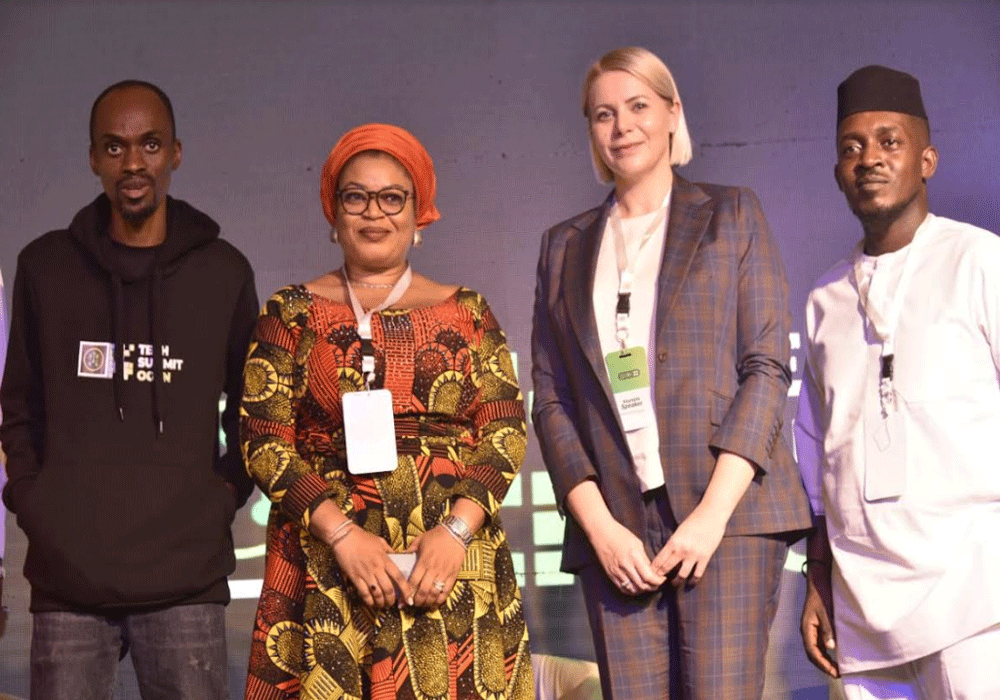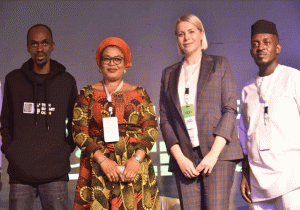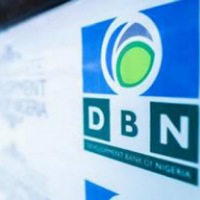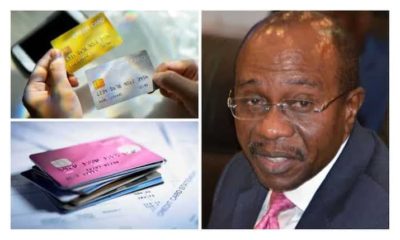Business
Financial Inclusion: 9PSB CEO Calls for Targeted Content in Nigeria

By EdozieObasi-Eze
The Chief Executive Officer, 9PSB, BrankaMracajac has emphasized the need to pay close attention to content creation as an important factor in driving and accelerating financial inclusion in the country, stating that it is capable of enhancing the future of digital banking in the long term.
Mracajac made this assertion while presenting a keynote address, themed “Content Creation and Financial Inclusion; The Future of Digital Banking” at the Tech Summit Ogun 2022, on Thursday, at the Olusegun Obasanjo Presidential Library Abeokuta, Ogun State.
According to her, while there are ongoing efforts to support the country’s financial inclusion drive, a lot more rest on formulating tailored strategies that address specific needs.

L-R: Olaniyi Ayoola, Team Lead and Convener, Tech Summit, Ogun, 2022; Abimbola Alale, Chief Executive Officer, Nigerian Communication Satellite Limited (NIGCOMSAT)/representing the Minister of Communications and Digital Economy; Branka Mracajac, Chief Executive Officer, 9 Payment Service Bank (9PSB)/Keynote Speaker, and Jude Abaga, Nigerian music producer, at the Tech Summit Ogun, 2022 which held recently at the Olusegun Obasanjo Presidential Library, Abeokuta, Ogun State.
“Providing access to the banking agents and touchpoints, across the country is happening as we speak; payment service banks, microfinance banks, and FinTech companies are all working on this.
But will this be enough? Will the access to digital banks change the mindset of Nigerians in rural areas of the country and be enough to drive the transition from cash to a cashless society?” she questioned.
Proffering the way forward, Mracajac stressed the need to provide financial literacy through content that speaks to an average Nigerian in unserved rural areas of the country, stating that financial inclusion is a process, not just a point in time and space that we want to reach.
Read Also >> NCDMB To Launch US$50m Fund For Oil Industry Manufacturing
She added that developing content that speaks only to the already banked and mirroring the digital financial habits of those who are fully included and heavily banked, will not help to keep the newly onboarded in the system long-term. She stated: “While creating and delivering the content for financial inclusion, we need to have in mind the needs of its beneficiaries, the targeted end-users of the financial services who are currently underserved and the only sustainable way is that we join our forces and create the content – apps and services that will address the specific needs of a farmer in Benue, market women in Onitsha, a trader in Kano, a fisherman in Delta, and the woman selling ofada rice in Ogun State”.
Speaking further, she noted that, to drive the offline individuals and MSMEs from cash to cashless, from analogue to digital and from informal to formal, content creators need to focus on two major goals; one, to deliver relevant and on-point digital financial literacy content, educating people about the principles, ways, modules, and benefits of banking.
The second one, she stated, is needed for sustainable Financial inclusion: delivery of digital banking services that are a reflection of the lifestyle of the currently unbanked and underserved population.
She called on all stakeholders within the financial ecosystem, including content creators to work collectively to develop and implement a digital content strategy for the unbanked to move the financial inclusion needle and ultimately advance the economy, society and improve the life of every Nigerian.
In his own keynote address, titled “Disruptive Innovation: Production and Distribution of Creative Content, the Honourable Minister of Communications and Digital Economy, Professor Isa Ali Ibrahim Pantami, who was represented by the Chief Executive Officer, Nigerian Communications Satellite Limited (NIGCOMSAT), Dr Abimbola Alale remarked that the quality of creatives and start-ups that Nigeria has produced is a testament to the potential of the ecosystem, and as such the ministry will continue to support the tech and creative entrepreneurs to play their part in developing Nigeria’s digital economy.
The Tech Summit Ogun is an annual convergence of Tech disruptors, innovators, startups, organizations and technology enthusiasts in Ogun State, aimed at spurring technological innovation towards the digital transformation and technological advancement of Ogun State.
This year, the summit attracted over 2000 participants, mainly the youths and start-ups.
Business
Savannah Energy Provides Unaudited FY 2024 Trading Updates

Savannah Energy has shared a trading update on its Nigerian operations and other markets in Africa, including up-to-date cash collections in its Nigerian business.
According to the update, made available on Thursday in Lagos, its gross production in Nigeria averaged 23.1 Kboepd for FY 2024, broadly in line with the prior year’s 23.6 Kboepd, of which 88% was gas (FY 2023: 91%).
On the update, CEO of Savannah Energy, Andrew Knott, said, “I am pleased to provide a FY trading update which demonstrates the continued progress we have made in 2024, a year which saw the highest level of cash collections ever recorded by our Nigerian business. 2025 is expected to be an exciting year for our Company: we have a large planned operational programme in Nigeria which is anticipated to enhance both our oil and gas production levels and capacity; we intend to progress our R3 East oil development project in Niger; we continue to pursue key acquisitions in the upstream oil and gas space; and we continue to seek to build our power business.
“Fundamentally, Savannah remains unequivocally an “AND” company, seeking to deliver strong performance both for the short AND long term across multiple fronts, and pursuing growth opportunities in both the hydrocarbon AND power sectors.”
The update It also shows that it generated a Total Income of US$393.6 million in 2024, compared to FY 2023’s US$289.8 million. This consists of Total Revenues of US$258.7 million and Other operating income of US$134.9 million.
The report also shows that Savannah’s FY 2024 Total Revenues were ahead of the previously issued financial guidance of greater than US$245 million, while FY 2024 financial guidance is reiterated for Operating expenses plus administrative expenses at ‘up to US$75 million’. The company expects its FY 2024 capital expenditure to come in lower than planned (previously guided at ‘up to US$50 million’) due to the phasing of spend.
ALSO READ: CSR: Dangote Awards Scholarships To 473 Students
According to the update, Savannah’s cash collections in 2024 amounted to US$248.5 million, a slight increase from the US$206 million it received in 2023. The report further shows that its cash balances as at 31 December 2024 stood at US$32.6 million, compared to the 31 December 2023 figure of US$107.0 million.
The report shows that the company’s midstream subsidiary, Accugas Limited, had as at 31 December 2024 drawn down on its NGN332 billion of the NGN Transitional Facility, with the resulting funds being converted to US$, which, along with cash held, was used to partially prepay the existing Accugas US$ Facility, leaving a balance as at 31 December 2024 of approximately US$212.3 million.
The report also provided new updates on Accugas’ US$45 million Uquo Central Processing Facility (“Uquo CPF”) compression project in Nigeria, noting that its commissioning which will enable the expansion of gas production in the medium term is well underway.
The report highlighted the progress being made in the procurement process of long lead equipment in Nigeria for a potential two-well drilling campaign on the Uquo Field in H2 2025, with an additional gas development well expected to add up to 80 MMscfpd of supplemental production capacity and a potential exploration well targeting an Unrisked Gross gas initially in place (“GIIP”) of 154 Bscf (25.7 MMboe) of incremental gas resources.
The update shows that progress is also being made in the planned Savannah acquisition of Sinopec International Petroleum Exploration and Production Company Nigeria Limited, whose principal asset is a 49% non-operated interest in the Stubb Creek oil and gas field (“Stubb Creek”), with regulatory approval and completion being targeted in Q1 2025. Following the completion of the acquisition, Savannah intends to commence an expansion programme which is anticipated to increase Stubb Creek gross production from an average of 2.7 Kbopd in 2024 to approximately 4.7 Kbopd.
In Niger, Savannah continues to seek to progress its 35 MMstb (Gross 2C Resources) R3 East oil development in South-East Niger, while it continues to push for a potential alternative transaction structure to acquire a material stake in producing oil and gas assets in South Sudan as previously announced on 20 December 2024.
On the renewable energy front, the update shows that Savannah has up to 696 MW of renewable energy projects currently in motion, including the up to 250 MW Parc Eolien de la Tarka wind farm project in Niger and the up to 95 MW Bini a Warak hybrid hydroelectric and solar project in Cameroon. A firm believer in Africa’s transition to renewable energy, Savannah continues to target a portfolio of up to 2 GW+ of power projects in motion by the end of 2026.
Business
Nigeria Can Achieve 5.5% GDP Growth – NESG
The Nigerian Economic Summit Group (NESG) has projected that the country has the potential to achieve a 5.5% growth in Gross Domestic Product (GDP) if critical policy reforms are sustained.
This was disclosed on Thursday during the launch of the NESG’s 2025 Macroeconomic Outlook report.
Speaking at the event, the Chief Economist and Director of Research & Development at NESG, Dr. Olusegun Omisakin, highlighted the need for more efficient policy implementation to unlock Nigeria’s economic potential.
READ MORE: Davido Is Richer Than His Billionaire Father – Ibrahim Chatta Claims
“We believe at the optimal level, if we embark on more efficient policy reforms, the Nigerian economy has the potential, the GDP to end up at 5.5 per cent, and we believe that this is achievable,” Omisakin stated.
More to follow……….
Business
CBN Approves Release Of Nigerian FX Code
The Central Bank of Nigeria (CBN) has announced the release of the Nigerian Foreign Exchange (FX) Code, a set of guidelines designed to promote ethical conduct among authorized dealers in the country’s FX market.
In a statement, the apex bank disclosed that the official launch of the Code would take place on Tuesday, January 28, 2025, at the CBN Head Office Auditorium in Abuja.
READ MORE: Dangote Denies Culpability In Pumping Up Petrol Price
“The Central Bank of Nigeria has approved the release of the Nigerian Foreign Exchange (FX) Code as a guideline to the banking industry to promote the ethical conduct of authorised dealers in the Nigerian Foreign Exchange Market,” the statement read.
The introduction of the FX Code is expected to enhance transparency, accountability, and professionalism within Nigeria’s foreign exchange ecosystem, aligning it with global best practices.
The event is anticipated to attract key stakeholders in the financial and banking sectors, as well as representatives from authorized FX-dealing institutions across the country.



















